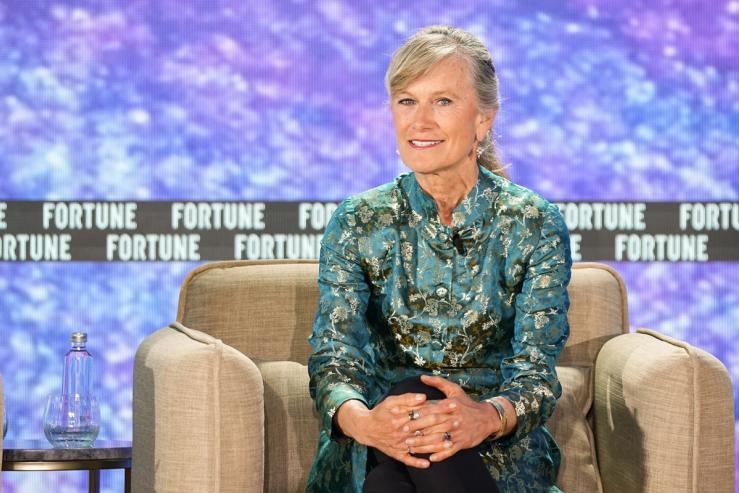The Signal Interview
Jacqueline Novogratz is a pioneer of social impact investing. Acumen, the venture capital fund she founded in 2001, brings an entrepreneurial approach to addressing poverty around the world, placing long-term “patient capital” bets on small businesses providing critical products and services in markets other investors fear to touch.
Between its inception and last December, Acumen has invested $301 million in 225 companies through philanthropy and for-profit impact funds. It is now aiming to triple its assets under management to $720 million across its portfolio and funds by the end of 2026.
As part of that push, Novogratz has hired Carsten Stendevad, former co-chief investment officer for Sustainable Investing at Bridgewater Associates, as Acumen’s new president and CIO. She has also struck partnerships with the World Bank, commercial lenders such as South Korea’s Shinhan Bank, and the corporate foundations of IKEA and SAP.
Acumen’s portfolio includes companies like D.light, whose affordable solar energy systems have reached more than 190 million people across Africa and Asia, and EthioChicken, which sells disease-resistant chickens to farmers in Ethiopia that produce five times as many eggs as local breeds.
But Novogratz’s ambitions extend beyond Acumen, as the onetime banker urges more business leaders to invest for impact beyond the next quarter’s earnings. Private-sector CEOs should show “moral imagination” as governments cut aid budgets, she says, telling them that “crazy-small” investments can have a transformative effect.
Here’s how she describes her vision of a more inclusive form of capitalism.
In this article:
The View From Jacqueline Novogratz
This interview has been condensed and edited for clarity.
Andrew Edgecliffe-Johnson: We’ve seen cuts to international aid budgets, most recently in the US. How does that change the need for impact investment?
Jacqueline Novogratz: It’s massively changing the need for this kind of investment, and it’s also urging a much higher level of creativity to go along with it. It behooves us to be less ideological and more pragmatic in the way that we understand that we need financially self-sustaining models. If you want scale and you want to use the market and you’re working with poor people, you’ve got to either partner with government[s], or use some of the new market instruments that put a price on externalities. We need to be much clearer about where the market efficiencies make the most sense. Where are markets limited, and where can we partner with whichever players can actually solve the problem? That’s what we should all be asking ourselves.
The corporate conversation on impact and purpose has gone quieter in recent years. Have Western businesses retreated from trying to solve the problems you’re addressing?
It’s a mix. People aren’t yelling from rooftops, but I do think there’s been a quiet conversation among corporate leaders and foundation leaders around language. And maybe we don’t need the language, because what matters is that we actually make the change. I personally interact with a lot of corporate CEOs who feel just a deep sense of responsibility right now.
Could the Acumen model apply in a more traditional corporate setting?
When I look at how many of our companies in food systems are supply chain companies — chocolates and eggs and coffee — they should be partnering with larger corporations as their distribution system. Beyond Good chocolate, which our for-profit agricultural fund has invested in, makes beautiful chocolate out of Madagascar and Uganda. It goes almost direct from farmers into Whole Foods [stores], and having that Whole Foods connection has been game-changing for the company and for the farmers. I would love to see more of that, where social enterprises that can operate at scale and quality partner with corporations that are using their access and true scale to build new kinds of markets. What’s needed is the moral imagination; if we’re going to build systems that include the people who’ve been overlooked and underestimated, we can’t be so distant from them.
Most companies measure returns by traditional financial metrics like the next quarter’s earnings. Is that going to change?
Yes. I don’t know a young person anywhere on the planet who thinks that the system that we have is working for the climate, for inequality, or for low-income people. This will be a bottom-up movement, a groundswell of people who are looking for new financial models and new heroes. When you look at Patagonia, Unilever, IKEA, and the great visionary entrepreneurs who created enduring companies, we don’t really remember just the money guys. We remember the people who dared to do things differently and make change. So my hope is that we start to look for new role models that are helping us create and build the solutions that get us to the next place. And I truly see a groundswell there. While I hear a lot of cynicism in some corners, part of me thinks it’s a last gasp.
Do you always have to sacrifice traditional financial returns to get the kind of impact that you’re seeing?
Yes. If you are focused on reaching low-income people in markets that have been overlooked, in ways that provide good, dignified jobs, then on a portfolio basis, there is a trade-off. You will get lucky with companies like EthioChicken, but that doesn’t always happen. When I think about what is important in our lives, I don’t think there’s any aspect that doesn’t come with some level of trade-off. Yet we don’t want to have that conversation when it comes to solving our biggest problems of poverty, which I find frustrating.
Notable
- Last year, more than 3,900 organizations managed $1.6 trillion in impact investing assets under management worldwide, representing a 21% compound annual growth in the total market since 2019, according to the Global Impact Investing Network.
- Impact investing is growing as ESG funds have fallen out of favor with the White House and its supporters.


